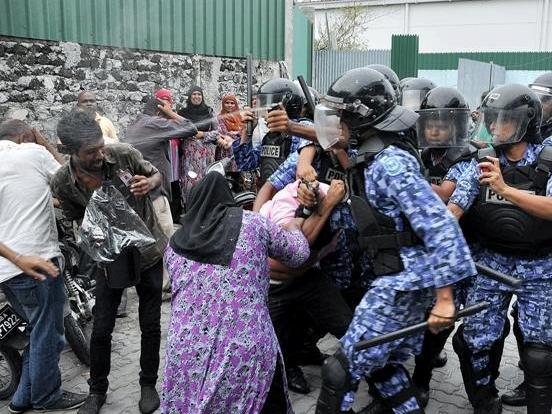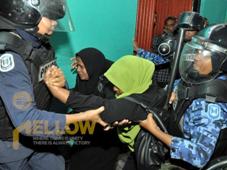Amnesty International has today released a report titled “The Other side of Paradise: A Human Rights Crisis in the Maldives”, chronicling human rights abuses in the country since the transfer of presidential power on February 7.
“Without an end to – and accountability for – these human rights violations, any attempt at political reconciliation in the Maldives will be meaningless,” said Amnesty’s researcher in the Maldives, Abbas Faiz.
Amnesty said that several of its human rights recommendations are reflected in the Commission of National Inquiry’s (CNI) report which was released on August 30.
The report details a number of incidents of police brutality on February 8, including attacks on Maldivian Democratic Party (MDP) MPs Eva Abdulla and Mariya Didi.
“The overall objective of these violent attacks has been to silence peaceful government critics and stifle public debate about the current political situation,” said the report.
“Based on Amnesty International’s interviews with survivors of these violent attacks, it appears that many were targeted by security forces because they were MDP ministers, parliamentarians or supporters,” it read.
The report recommended that the Maldivian government “ensure prompt, independent, impartial and effective investigations into allegations of violence by officials.”
“Those suspected of offences involving such violations, irrespective of rank or status, must be prosecuted in proceedings which meet international standards of fairness.”
It also urged the government to “remove any bias in the police force, so they act as officers of law without prejudice, and do not take sides politically.”
Tension between the police has continued unabated since the release of the CNI report, with continued MDP demonstrations being met with large numbers of arrests.
The police service last week confirmed that they would be arresting people for using the term ‘baghee’ (a Dhivehi word meaning a traitor who brought about or participated in a coup).
The report is based largely on the testimony of individuals interviews conducted during a three week Amnesty visit in February and early March this year.
Commissioner of Police Abdulla Riyaz, who was unavailable for comment at the time of press, told Minivan News in April that he had been disappointed by Amnesty’s failure to ask the police for its comments before releasing a report based on its findings.
“I don’t see that there has been any investigations done, none of our officers was questioned, interviewed – neither by them nor by the Police Integrity Commission (PIC), nor by the Human Rights Commission (HRCM). I don’t think that’s fair,” said Riyaz.
Strong pressure on weak institutions
As well as concluding that President Mohamed Nasheed was not removed from office unconstitutionally, the CNI report acknowledged that his resignation was accompanied by acts of police brutality which it said must be investigated.
“With respect to the administration of justice, in particular concerning allegations of police brutality and acts of intimidation, there is an urgent need for investigations to proceed and to be brought to public knowledge with perpetrators held to account and appropriately sanctioned,” read the report.
Shortly after the report’s release, the Home Minister Dr Mohamed Jameel Ahmed told a press conference that the government did not intend to take action against anyone other than the former President in relation to the CNI’s conclusions.
Jameel stated the responsibility for the investigation of police misconduct would fall upon the Police Integrity Commission (PIC).
This has prompted renewed focus on the apparent weakness of such independent institutions in the Maldives.
“One of the reasons for the 7 February and the associated crisis is weak institutions, and the democratic institutions in Maldives must shoulder at least some of the blame for not being pro-active enough in working to address urgent issues,” said Aiman Rasheed of local NGO Transparency Maldives.
“Providing room for institutions to grow organically, and address institutional issues in an environment free from fear and intimidation from the political overlords is more important for Maldives at the moment,” Aiman continued.
“The independent institutions need to step up their game by standing for and protecting the values for which they were constituted,” he said.
Following Jameels announcement, Chair of the PIC Shahinda Ismail said that she was “very sceptical of the burden we will have to carry”, citing concerns over the lack of clarity in the CNI report and loopholes which prevent the implementation of its recommendations.
Shahinda alleged that certain clauses in the Police Act had already resulted in the Home Minister ignoring recommendations forwarded to him concerning incidents from February 8.
Similarly, a Supreme Court ruling concerning the activities of the Anti Corruption Commission (ACC) earlier this week appeared to the leave this institution in a state of limbo.
“In other countries, Anti Corruption Commissions have the powers of investigation, prevention and creating awareness. If an institution responsible for fighting corruption does not have these powers then it is useless,” said ACC President Hassan Luthfee.
Weak institutions have often been described by prominent members of the current government as rendering the country unready for early elections despite months of political stultification.
“Tighter legislation that addresses ambiguities and close legal loopholes will help. However, the political will to truly reform key institutions is lacking, especially the judiciary and the parliament,” said Aiman.
The final recommendation of Amnesty’s report was directed at the international community, requesting that it provide human rights training to the Maldives’judges, prosecutors and law enforcement officials.
In April, the United States pledged US$500,000 (Rf7.7 million) to assist Maldivian institutions in ensuring a free and fair presidential election.
The American Embassy in Colombo also conducted an information session on democratic rule of law for senior officers and management of the police service in May.

